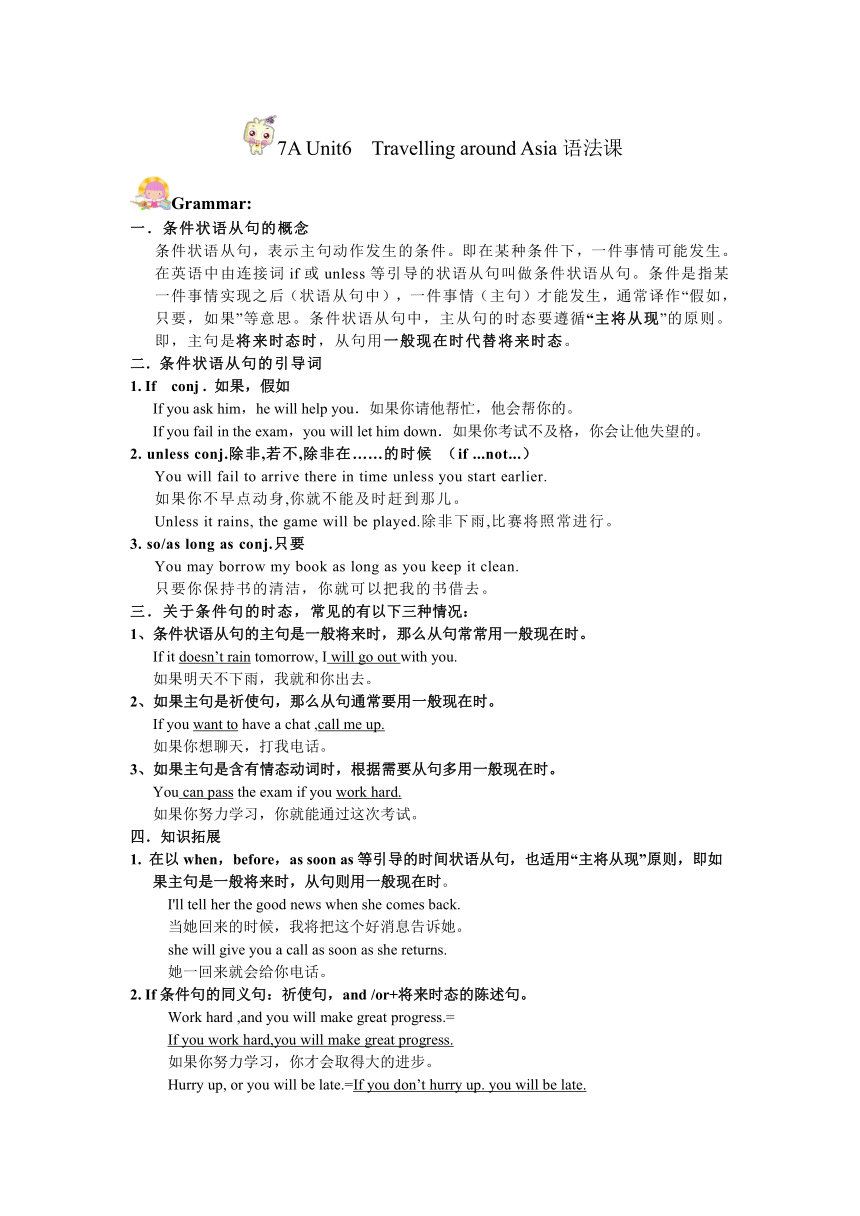
7A Unit6 Travelling around Asia语法课 Grammar: 一.条件状语从句的概念 条件状语从句,表示主句动作发生的条件。即在某种条件下,一件事情可能发生。在英语中由连接词if或unless等引导的状语从句叫做条件状语从句。条件是指某一件事情实现之后(状语从句中),一件事情(主句)才能发生,通常译作“假如,只要,如果”等意思。条件状语从句中,主从句的时态要遵循“主将从现”的原则。即,主句是将来时态时,从句用一般现在时代替将来时态。 二. 条件状语从句的引导词 1. If conj . 如果,假如 If you ask him,he will help you.如果你请他帮忙,他会帮你的。 If you fail in the exam,you will let him down.如果你考试不及格,你会让他失望的。 2. unless conj.除非,若不,除非在……的时候 (if ...not...) You will fail to arrive there in time unless you start earlier. 如果你不早点动身,你就不能及时赶到那儿。 Unless it rains, the game will be played.除非下雨,比赛将照常进行。 3. so/as long as conj.只要 You may borrow my book as long as you keep it clean. 只要你保持书的清洁,你就可以把我的书借去。 三.关于条件句的时态,常见的有以下三种情况: 1、条件状语从句的主句是一般将来时,那么从句常常用一般现在时。 If it doesn’t rain tomorrow, I will go out with you. 如果明天不下雨,我就和你出去。�2、如果主句是祈使句,那么从句通常要用一般现在时。 If you want to have a chat ,call me up. 如果你想聊天,打我电话。 3、如果主句是含有情态动词时,根据需要从句多用一般现在时。 You can pass the exam if you work hard. 如果你努力学习,你就能通过这次考试。 四.知识拓展 1. 在以when,before,as soon as等引导的时间状语从句,也适用“主将从现”原则,即如果主句是一般将来时,从句则用一般现在时。� I'll tell her the good news when she comes back. 当她回来的时候,我将把这个好消息告诉她。� she will give you a call as soon as she returns. 她一回来就会给你电话。 2. If条件句的同义句:祈使句,and /or+将来时态的陈述句。 Work hard ,and you will make great progress.= If you work hard,you will make great progress. 如果你努力学习,你才会取得大的进步。 Hurry up, or you will be late.=If you don’t hurry up. you will be late. 如果你不快点,你就要迟到了。 【语法基础知识巩固训练】 一.选择正确的答案,并划√。 1. Ann (will go/go/goes) to Hong Kong if she (will pass/pass/passes) the exams. 2. If there (will be/are/is) a car accident, they (will call/call/calls) 110 for help at once. 3. If a UFO (will land/land/lands) in front of me, I (will go/go/goes) in to look for the alien 4. I (will call/ call) you if my mum (will stay/stay / stays) at home. 5. Mr Liu (will let / let /lets) you know if he (will need/ need/ needs) help. 6. (Will / Do/ Does) he visit the Ocean Park if he (won't / don't/ doesn't) get tired? 7. Where (will/ do /does) they live if they (will miss/ miss/ misses) the bus? 二.将下列句子合并成含if的条件句。 1. You can come with us. All of us are happy. _____ 2. He works hard. He gets good marks. _____ 3. You come late. You miss the train. _____ 4. She doesn't dress up. They don't let her into the party. _____ 5. I go there. The rain stops. _____ 三、用所给词的适当形式填空(15分,每小题1分) 1. If you _____(feel) tired, you _____ (have) ... ...
~~ 您好,已阅读到文档的结尾了 ~~